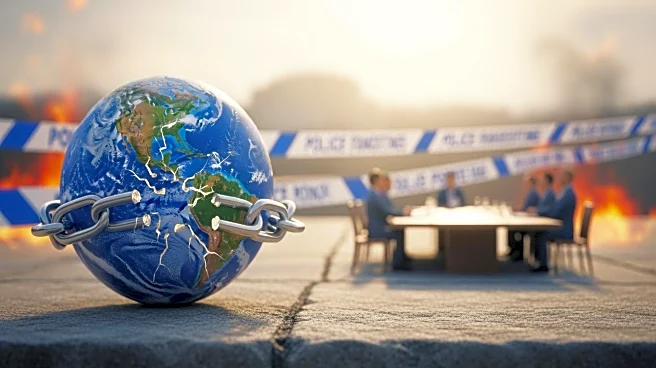What's Happening?
The United States, in collaboration with Israel, is preparing a resolution for the United Nations Security Council to establish a post-war security stabilization force in the Gaza Strip. The initiative
aims to secure international support without imposing restrictive conditions on Israel or granting the Security Council direct control over Gaza's security management. The resolution seeks to avoid invoking Chapter 7 of the UN Charter, which allows the use of force and grants the Security Council broad authority. The proposal is designed to encourage countries to contribute to the force while maintaining Israel's operational freedom. The draft resolution has not yet been formally introduced, but there is close coordination between Washington and Jerusalem on its language.
Why It's Important?
This development is significant as it reflects the geopolitical dynamics surrounding the Gaza Strip and the broader Middle East region. The resolution aims to balance international involvement with Israel's security concerns, potentially affecting regional stability and diplomatic relations. The initiative could influence the participation of countries like Indonesia, Azerbaijan, the United Arab Emirates, and Egypt in the stabilization force, impacting their diplomatic ties with Israel and the United States. The proposal also highlights the strategic interests of the US and Israel in shaping the post-war environment in Gaza, while addressing pressures from Arab states seeking international legitimacy for their involvement.
What's Next?
The United States is moving quickly to present the resolution, partly due to pressure from Arab states that require a Security Council resolution for international legitimacy. The draft resolution is expected to be introduced soon, with diplomatic discussions ongoing to finalize its language. The outcome of these negotiations could determine the composition and leadership of the stabilization force, with Israel expressing concerns over European leadership, particularly from France. The resolution's progress will be closely watched by international stakeholders, as it could set a precedent for future UN involvement in regional conflicts.
Beyond the Headlines
The proposal raises questions about the role of international organizations in conflict resolution and the balance between national sovereignty and global governance. The reluctance to invoke Chapter 7 of the UN Charter reflects concerns over the potential for international mandates to limit national autonomy. The initiative also underscores the complexities of Middle Eastern diplomacy, where regional and international interests often intersect. The resolution's impact on the UN's credibility and effectiveness in peacekeeping operations could have long-term implications for its role in global security.












